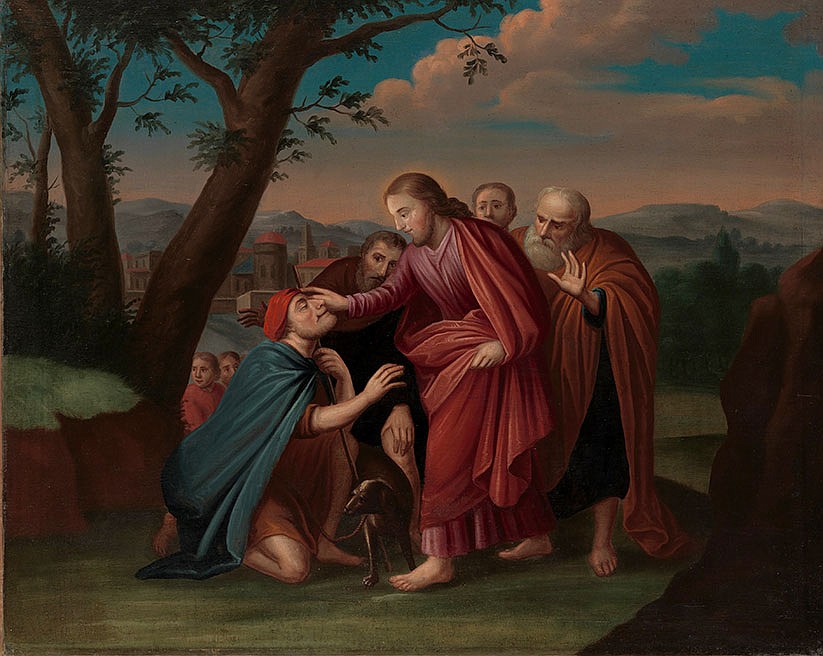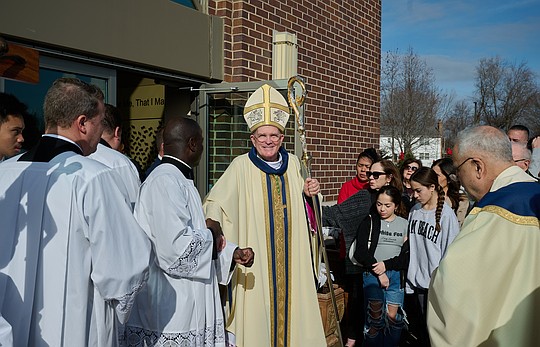Father Koch: The blind man sees the Light of the World
March 16, 2023 at 4:38 p.m.

Samuel the prophet is instructed by the Lord to go to a small shepherd village called Bethlehem to anoint as the future king one of the sons of Jesse.
Having met the man’s older sons, Samuel quickly learns that the Lord has not chosen any of them. Confused by the situation he learns that Jesse has one more son, David, his youngest, who is off tending the sheep.
Samuel anoints David -- laying not only the foundation for the future kings of Israel, but implanting the seeds of the messianic expectations: the Anointed One -- Messiah or Christ -- would come in the Davidic line and as savior and king. Jesus is this anointed one, coming some 1,000 years after the anointing of David.
Jesus as the Anointed One, then, hands-on this anointing to his disciples. For the disciples this was done figuratively as Jesus prayed over them and for them at the Last Supper. They are anointed also through their own passion and martyr’s death.
The early Christian community, in acknowledging and proclaiming Jesus as the Anointed One, then also continued the tradition of anointing with sacred oil, to signify empowerment by the Holy Spirit and the authority to forgive sins. Consequently, we use oil liberally in the celebration of four of the seven Sacraments: Baptism, Confirmation, Ordination to Sacred Orders, and the Anointing of the Sick.
As Lent is a time for us to reflect deeply on Baptism in preparation for the baptismal liturgy of the Easter Vigil, the Church offers us the sacramental elements in the Sunday Readings of Lent. This is especially true in the A-Cycle of readings, which we are using this year.
On the Third Sunday in Lent, we heard the account of the Samaritan Woman at the well of Jacob, where Jesus offered to her the water of eternal life. On the Fourth Sunday in Lent, we hear the account of the Man Born Blind.
Once again, the essential elements of baptism are clearly manifested in the healing of the blind man at the Pool of Siloam in Jerusalem. Unlike most of the miracles of Jesus this man is healed, not because of his own faith, but as a demonstration -- or for John a sign -- of Jesus’s power over sin. This man, blind from birth, waits by the pool hoping for God’s mercy in his life. Jesus, confronted with the question of sin, restores this man’s sight by having him wash in the pool. Jesus uses this miracle to teach two things: he is the light of the world, and he has the power to wash away our sins. These same elements are expressed in the baptismal waters.
John freely uses the imagery of light and darkness/day and night throughout his Gospel. He sees the contrast between evidenced in those who live in the light of faith and the darkness of sin or ignorance of God’s presence in the world.
Jesus encounters this man and is asked the question as to the nature of his sinfulness. For the Jewish world of that time would understand a person born with an affliction such as blindness as a sign of sin. Jesus transforms that sign into a sign of mercy and faith.
The mature person coming to faith and thereby seeking to be baptized is moving from darkness to light. The church opens the Easter Vigil in darkness and, then through the lighting of the Paschal Candle, penetrates that darkness with light.
Jesus made a pack of mud and smeared it on this man’s face, in a sense anointing him, and then instructed him to wash himself clean in the pool. While this reflects back to the creation of Adam -- Jesus formed the man in the mud -- it also points us to new creation and new life.
At Baptism, the candidate is anointed with the Oil of Catechumens. Baptism is made complete in Confirmation when the Sacred Chrism is used to anoint the neophyte.
It is through this progression in faith that we move from darkness to light; from night into day.
Father Garry Koch is pastor of St. Benedict Parish, Holmdel.
Related Stories
Friday, January 02, 2026
E-Editions
Events
Samuel the prophet is instructed by the Lord to go to a small shepherd village called Bethlehem to anoint as the future king one of the sons of Jesse.
Having met the man’s older sons, Samuel quickly learns that the Lord has not chosen any of them. Confused by the situation he learns that Jesse has one more son, David, his youngest, who is off tending the sheep.
Samuel anoints David -- laying not only the foundation for the future kings of Israel, but implanting the seeds of the messianic expectations: the Anointed One -- Messiah or Christ -- would come in the Davidic line and as savior and king. Jesus is this anointed one, coming some 1,000 years after the anointing of David.
Jesus as the Anointed One, then, hands-on this anointing to his disciples. For the disciples this was done figuratively as Jesus prayed over them and for them at the Last Supper. They are anointed also through their own passion and martyr’s death.
The early Christian community, in acknowledging and proclaiming Jesus as the Anointed One, then also continued the tradition of anointing with sacred oil, to signify empowerment by the Holy Spirit and the authority to forgive sins. Consequently, we use oil liberally in the celebration of four of the seven Sacraments: Baptism, Confirmation, Ordination to Sacred Orders, and the Anointing of the Sick.
As Lent is a time for us to reflect deeply on Baptism in preparation for the baptismal liturgy of the Easter Vigil, the Church offers us the sacramental elements in the Sunday Readings of Lent. This is especially true in the A-Cycle of readings, which we are using this year.
On the Third Sunday in Lent, we heard the account of the Samaritan Woman at the well of Jacob, where Jesus offered to her the water of eternal life. On the Fourth Sunday in Lent, we hear the account of the Man Born Blind.
Once again, the essential elements of baptism are clearly manifested in the healing of the blind man at the Pool of Siloam in Jerusalem. Unlike most of the miracles of Jesus this man is healed, not because of his own faith, but as a demonstration -- or for John a sign -- of Jesus’s power over sin. This man, blind from birth, waits by the pool hoping for God’s mercy in his life. Jesus, confronted with the question of sin, restores this man’s sight by having him wash in the pool. Jesus uses this miracle to teach two things: he is the light of the world, and he has the power to wash away our sins. These same elements are expressed in the baptismal waters.
John freely uses the imagery of light and darkness/day and night throughout his Gospel. He sees the contrast between evidenced in those who live in the light of faith and the darkness of sin or ignorance of God’s presence in the world.
Jesus encounters this man and is asked the question as to the nature of his sinfulness. For the Jewish world of that time would understand a person born with an affliction such as blindness as a sign of sin. Jesus transforms that sign into a sign of mercy and faith.
The mature person coming to faith and thereby seeking to be baptized is moving from darkness to light. The church opens the Easter Vigil in darkness and, then through the lighting of the Paschal Candle, penetrates that darkness with light.
Jesus made a pack of mud and smeared it on this man’s face, in a sense anointing him, and then instructed him to wash himself clean in the pool. While this reflects back to the creation of Adam -- Jesus formed the man in the mud -- it also points us to new creation and new life.
At Baptism, the candidate is anointed with the Oil of Catechumens. Baptism is made complete in Confirmation when the Sacred Chrism is used to anoint the neophyte.
It is through this progression in faith that we move from darkness to light; from night into day.
Father Garry Koch is pastor of St. Benedict Parish, Holmdel.










